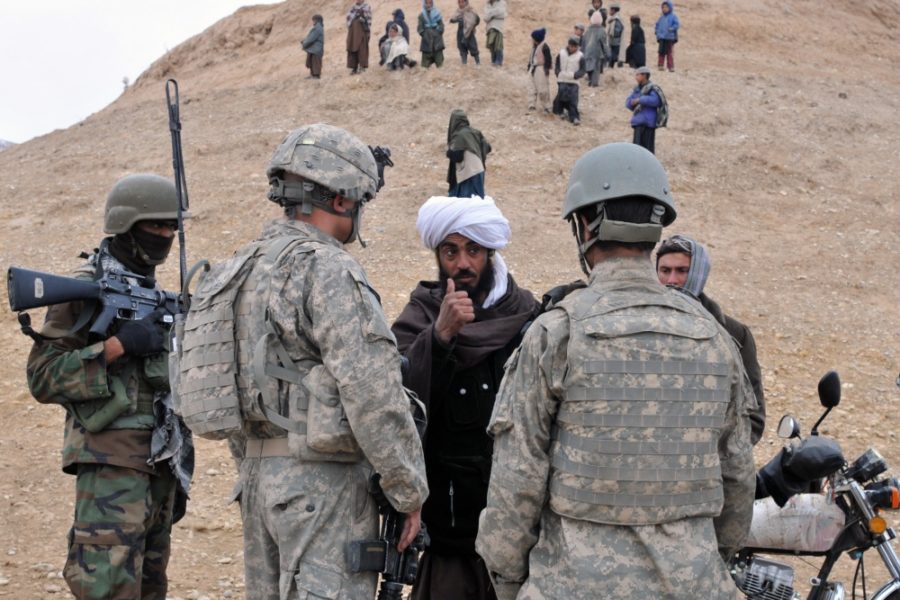In the months after President Joe Biden announced the U.S. would fully withdraw from Afghanistan by Sept. 11, veterans groups lobbied on behalf of Afghan nationals looking to obtain special immigrant visas, urging Congress and the White House to speed up the bureaucratic process for interpreters and other partners and ensure they would not be left to face a rapidly advancing Taliban.
Now that the Taliban has seized control after an astonishingly quick conquest, U.S. troops remain only at the Hamid Karzai International Airport in Kabul, and thousands of SIV seekers and their families are in danger while veterans halfway across the globe scramble to help as many as they can.
Over Facebook, LinkedIn, text, and email, hundreds of veterans are in contact with Afghans who aided the U.S. mission over the past 20 years, retired Army Col. Steven M. Miska, director of the organization First Amendment Voice, told Air Force Magazine. The pleas for help are increasingly desperate as the Taliban establishes checkpoints and strictly regulates access to the airport.
In response, veterans have helped by backing up files and documents related to SIV applications. Then, they’ve offered what may seem like surprising advice:
“Erase everything on your phone, and burn those documents,” said Zach Asmus, a retired Airman and active volunteer with Combined Arms, a veterans group. “I mean, these are things that people have been clinging to for 20 years. They would never part with these things, because that’s your ticket out of the country. But right now if you’re caught with that on you, you’re identified as allied to the Americans, so it’s pretty much a death sentence.”
Even beyond those measures, both Asmus and Miska said, former Afghan interpreters and partners are being urged to scrub their digital presence—erase Facebook pages, wipe search engine histories, delete photos—to ensure the Taliban cannot tie them to the Americans.
“The Taliban are honestly pretty tech savvy,” Asmus said. “They’re going through people’s phones—they’re even searching their Google history. So if you’ve looked up ‘SIV application’ or ‘U.S. embassy’ or whatever, they’ll look through your pictures, they’ll look through your Google history, they’ll look through your email. And if you’ve got any ties to any of the things that we just mentioned, you’re in big trouble.”
The exact number of Afghans still in the country who are seeking special immigrant visas is not certain at the moment, as Air Force planes continue to ferry out evacuees in a chaotic environment.
Recent estimates, however, pegged the number of backlogged SIV applicants at around 20,000, said Lawrence Montreuil, a retired Marine Corps officer and current legislative director for the American Legion. Add in their families, and that makes roughly 70,000 men, women, and children in need of evacuation. At this point, getting them all out will be difficult, if not impossible, Montreuil said.
It’s a sentiment shared by others who spent months warning that such a situation might unfold unless the Biden administration or Congress acted with urgency. The American Legion and other organizations have been lobbying on behalf of the former interpreters for years now but say the SIV program was underfunded and underprioritized.
Miska has firsthand experience in aiding local partners, helping to establish an “underground railroad” in Iraq to get interpreters and allies to safety amid sectarian violence. He and others advocated for evacuations to take place before the situation devolved, pointing to past instances when the U.S. has first transported refugees to Guam or military installations for safety then processed them for visas before they were allowed to enter the country.
As the situation has become a crisis, Asmus said, the U.S. should take the most expansive approach possible in determining which Afghans it will allow on planes—not necessarily to go directly to America, but to at least have the opportunity for their SIV application to be processed while in safety.
“You have to consider everyone that has even hit the ‘Start my application’ button as a possible person that’s going to be vetted,” Asmus said. “You have to allow them safe harbor to get the documents, to contact supervisors, to be fully vetted, because we have full confidence that these 18,000 that have started the application are going to have a high acceptance rate.”
That confidence is borne from the deep bonds many veterans formed with their Afghan interpreters and counterparts throughout the course of deployments. Working closely together for so long, they became friends and partners—and now that the Afghans face potentially deadly consequences because of those bonds, the veteran community is “animated,” Miska said.
“I can speak from personal experience,” Montreuil added. “I was an Afghan National Army advisor in southern Afghanistan, and I can tell you that they were essential to not only mission accomplishment but our survival on a daily basis. So I think it’s that moral necessity that veterans feel.”
As a combat controller, Asmus had closer contact with Afghan interpreters than many in the Air Force. He, too, called them integral to the mission and said he feels compelled to advocate for them now.
“What we said to them was, ‘Hey, if you raise your hand and you help us, and you keep us safe and you let us … get home safe to our families in a couple months, we want to tell you that, you know, we appreciate that and we’re going to reciprocate that and hopefully get you back to the U.S. one day if you follow these SIV application instructions,’” Asmus said. “But the fact that maybe they do that, and it looks like they’ve exhausted everything on their end and then they’re stuck in any sort of bureaucratic red tape, it’s really a sad thing.”
At the moment, however, there is only so much veterans can do as they watch a dangerous, chaotic situation that could change at any moment. Still, what little support and help they can provide can be crucial, Miska said.
